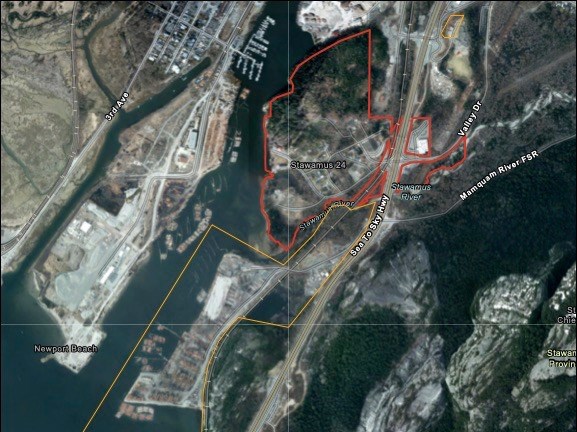The Sḵwx̱wú7mesh Úxwumixw (ߣ������Nation) announced a sweeping initiative to create a roadmap for potential development on 140 hectares of its land across the Lower Mainland and Sunshine Coast, including the ߣ������ar
In Squamish, this opens up the possibility for significant development on the stretch of Nation land in and around Stá7mes (Stawamus 24) reserve and Site B in a few years' time.
On March 29, the officials from the Nation's council and its development arm, the Nch'ḵay̓ Development Corporation, held a press conference declaring there will be a one-year moratorium on all third-party development proposals on its territory.
This will allow the Nation to devote time to creating capital plans and land use strategies that will guide future development in Squamish, as well as their territory throughout North Vancouver, West Vancouver and Gibson's Landing. The Nation is seeking firms to help it formulate these plans.
During the conference, officials said there would be much emphasis on addressing the provincewide need for more housing.
However, there would also be consideration for other types of development, including industrial, commercial and infrastructure.
In an interview with The ߣ������, Khelsilem, chair of the Nation's council, acknowledged that development has been a sensitive topic in town.
However, Khelsilem said there is a great need for more local housing.
"ߣ������has some of the worst affordability in the province," he said, while also noting the very low vacancy rates.
"So when we look at these issues of: why are things so expensive? Why is it so hard to find a place to rent? Why is rent so high? It's because the District of ߣ������is not building enough housing. And so this is where the ߣ������Nation has a lot of land assets."
He noted the amount of development in ߣ������may not necessarily mirror the Nation's development in other communities.
"What we do in the town of ߣ������is going to be largely different than what we might do elsewhere," said Khelsilem. "It [also] depends on what the site itself in terms of the land can actually do as well."
Infrastructure
Aside from the Stá7mes area, another zone in ߣ������is expected to be identified as an area of potential development, but this has yet to be determined.
He said it would be unlikely that development would occur on Nation land in the Murrin Park area. Local recreationalists raised concerns about possible impacts to Murrin Park back in 2019 when some of that land was transferred to the Nation.
"Staff haven't come up with a recommendation on the second site in ߣ������yet," said Khelsilem. "That's due to come back, but it'll largely focus on areas where there's a higher potential for economic development [and] has a closer proximity to infrastructure and other amenities."
Aside from major development projects, the Nation is considering infrastructure improvements. This may include drinking water access improvements on the Cheekye, or Cheakamus 11, reserve,
Khelsilem said that water test results from that area have shown that the water is potable, but locals' perception is that it is unsafe to drink.
There have been bottled water deliveries to the reserve, though some residents have said this is not enough.
"We're now exploring the potential of actually extending a water line from the District of ߣ������all the way up to Cheekye," said Khelsilem.
"[We're] working with the District to apply for funding from the federal government to support that. We've also received money out of the clash class action settlement related to drinking water advisories on First Nations land. And so, we've received a bit of money for infrastructure that will go towards whatever system that we ultimately choose."
He said different options, such as a water well, are being explored, but the Nation is particularly interested in the idea of a water line.
"If we partner with the District, that actually could expand some infrastructure through that whole area," he said.




